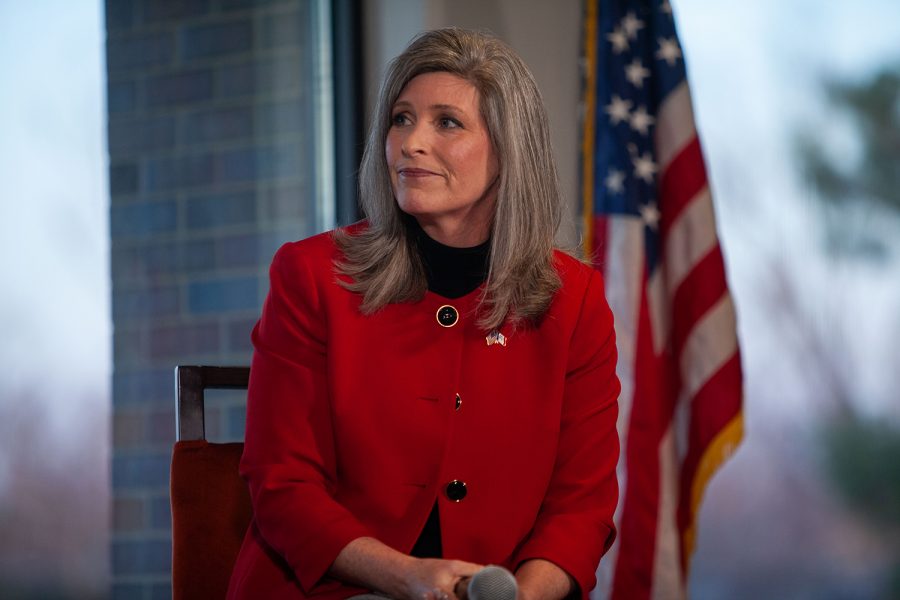‘It makes me sizzle:’ Joni Ernst proposes bill to prevent ‘Meatless Monday’ initiative in government agencies
Sen. Joni Ernst, R-Iowa, proposed a bill that would prevent government agencies from banning meat in dining halls, citing a USDA newsletter years ago that encouraged staffers to eat vegetarian options one day a week.
U.S. Sen. Joni Ernst (R-Iowa) speaks to a crowd on Thursday, April 1 at an Iowa GOP regional reception in Cedar Rapids at the Elmcrest Country Club. Ernst talked about her time as a child wearing bread bags.
April 13, 2021
Sen. Joni Ernst, R-Iowa, will introduce a bill in the U.S. Senate that would prohibit government agencies from enacting policies to ban meat consumption by employees, referring to the “Meatless Mondays” initiative promoted by the U.S. Department of Agriculture nine years ago under former President Barack Obama.
“What we’re now seeing across the board and in the federal government is a move to eliminate animal agriculture or severely cut it back,” Ernst told reporters Tuesday. “It comes in the form of the Green New Deal and what’s being implemented in different policies and plans, even through legislation promoted by some of my colleagues, where there is a push to curtail animal agriculture.”
In 2012, the USDA sent a newsletter to government employees encouraging them to not eat meat once a week, hence Meatless Mondays, as a part of a larger environmental effort. The USDA did not impose a ban on meat consumption in government agencies.
The bill named the TASTEE Act — Telling Agencies to Stop Tweaking What Employees Eat Act of 2021 — would ensure that federal agencies can’t ban meat in government dining halls “at the expense of Iowa’s and America’s hardworking farmers and producers.” President Joe Biden has not publicly indicated that he plans to encourage Meatless Mondays.
Meatless Mondays is an international initiative to encourage people to cut back on meat consumption for environmental concerns. The Environmental Protection Agency’s February 2020 Inventory of U.S. Greenhouse Gas Emissions and Sinks report showed that in 2018, animal agriculture emitted 6.7 billion metric tons in carbon dioxide equivalents, up 2.9 percent from the year prior.
“There have been bills that have been written by colleagues, such as Cory Booker, who is a good friend, but is vegan, who also believe in cutting back on animal agriculture,” Ernst said. “So, there is definitely a move afoot. And this is one way that we can start pushing back, we certainly don’t want to let it continue to creep along until it’s actual policy or law.”
Sen. Cory Booker, D-N.J., introduced legislation in 2019 with Sen. Elizabeth Warren, D-Mass., to phase out existing factory farms and concentrated animal feeding operations. Booker has been outspoken on giving small and family farmers a level playing field and imposing regulations on larger corporations.
According to a report from PolitiFact Iowa, the Green New Deal resolution would not eliminate agriculture, and Biden has not endorsed the legislation. While Biden’s climate plan says that the resolution provides a “crucial framework” for addressing climate change, there are some key differences.
Rob Jackson, an earth system science professor at Stanford University, told PolitiFact Iowa that there is no basis to the claim that the Green New Deal would ban animal agriculture, and there are many ways to cut back on greenhouse gas emissions that do not include cutting back on animal agriculture.
In 2017, Iowa’s cattle industry contributed about $6.8 million to Iowa’s business economy, according to the Iowa Beef Industry Council. Iowa is also the top state for pork production and pork exports as of 2020, and according to the Iowa Pork Producers Association, there are 24 million hogs being raised in Iowa at any one time.
Ernst told reporters that she has not seen a financial impact on cattle consumption in Iowa from what she called the left’s “War on Meat,” but she said this bill is to raise awareness and promote consumer choice. She also said that outside of the 2012 Meatless Mondays initiative, other attacks on the meat industry have been largely hidden.
“Farming and ranching is not only critical to our jobs, our economy, our culture, and our way of life here in Iowa, it is also in our DNA,” Ernst said. “So when I hear calls from the liberal left, everyone from out of touch politicians to Hollywood elite encouraging people to ban meat and the quality agricultural products we produce here in Iowa, it makes me sizzle.”



